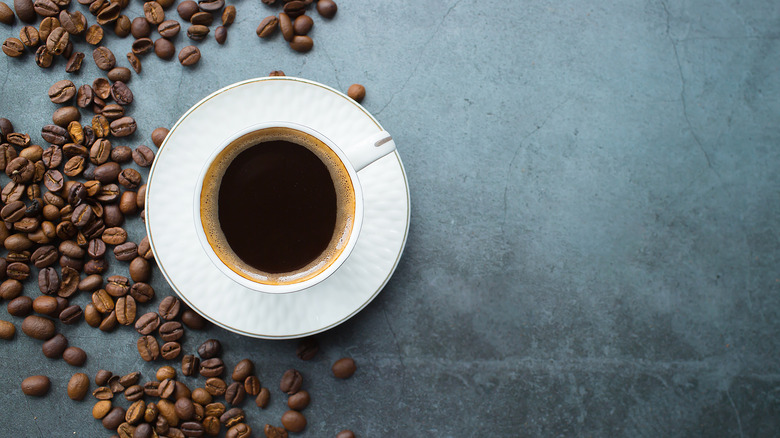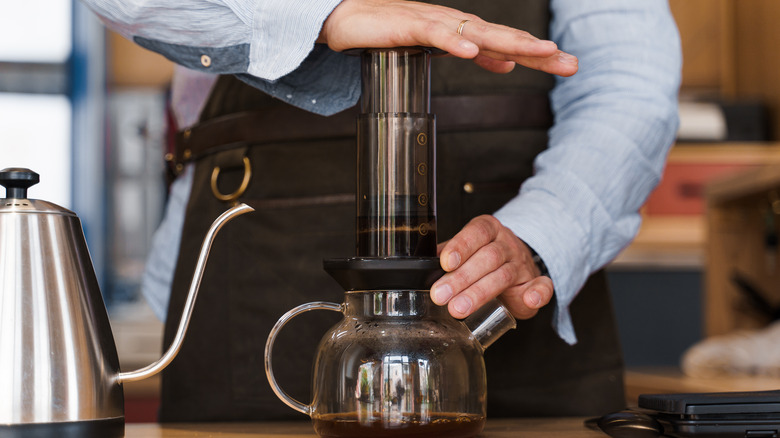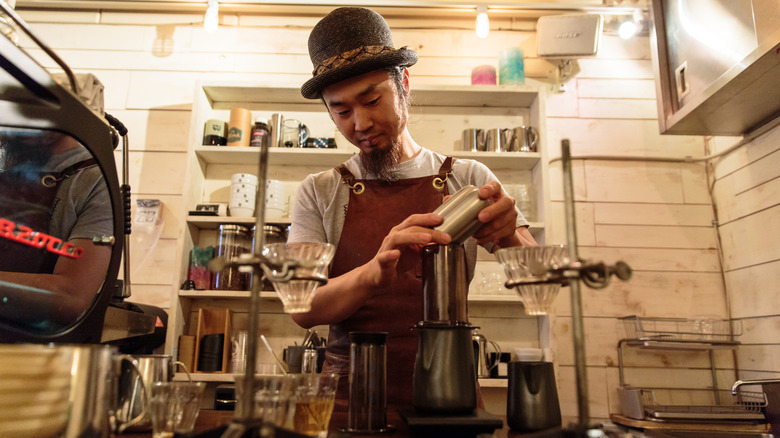Coffee Fans Tell Tasting Table This Is The Worst Brewing Method
Choosing a brewing method for coffee is purely a matter of preference. There's no single right way to make a cup of coffee, as each method has its unique benefits, drawbacks, and qualities. That said, when we asked Tasting Table readers to weigh in on their favorite way to make coffee, there was one clear loser.
We asked 588 people to tell us which of the following brewing methods is their favorite — drip, French press, cold brew, espresso, and AeroPress. Factors that influence the choice of brewing method might include convenience, speed, and flavor, and while it's possible to get delicious coffee from all five of the brewing methods, there are major variations among the methods when it comes to convenience and speed. That's why we weren't at all surprised to learn that the preferred brewing method — by a pretty large margin — is drip coffee.
An impressive 45% of readers prefer making drip coffee, as it's the easiest method, and also because programmable brewers can mean your first cup of coffee is brewing before you even get out of bed. Additionally, drip coffee makers are the single best way to make coffee for a crowd or for those of you who drink many cups of coffee each day. So drip coffee is the clear favorite, but what about the other methods?
One brewing method got almost no love
Espresso is the second favorite coffee brewing method, capturing 21% of votes. Tied for third place with 16% of votes are French press and cold brew methods. And way down at the bottom, with a measly 1% of votes is the AeroPress. Only seven readers of 588 chose the AeroPress as their favorite method. Why are other brewing methods preferred by such a large margin?
We get it. Espresso is amazing. Coffee Beans 101 explains that it's the richness of flavor and the thicker texture of espresso that combine to make it such a powerful sip on its own and such a perfect base for other coffee beverages like cappuccinos and lattés. The French press method is beautiful in its simplicity, and Lifehack points out that the absence of a paper filter means the flavorful and aromatic oils in a coffee bean stay in your beverage, rather than being stripped from your cup of coffee.
A French press requires a bit of patience, though, since the coarse-ground coffee needs to steep for four or five minutes to extract flavor. And patience? You've certainly got to have it for cold brew, as the ideal steeping time is about 18 hours. Yes, you'll be rewarded with beautifully smooth coffee with low acidity, but cold brew requires planning ahead. And that brings us to the AeroPress. Why did AeroPress fare so poorly with readers? Evidently, it's a brewing method that's seriously divisive.
AeroPress is polarizing
Joyride Coffee lays out the pros and cons of the AeroPress coffee maker, which debuted in 2005. While Joyride does point out that the brewer's plastic construction is both durable and portable, they also say the AeroPress "is and feels like the private possession of a coffee nerd." The "nerd" descriptor is pretty apt for AeroPress, developed by retired engineering instructor, Alan Adler. Adler, previously best known for having created the Aerobie flying ring, which set a Guinness record for the farthest thrown object, decided to perfect coffee brewing. And his method has its devotees.
Pull & Pour Coffee loves the AeroPress because, while it's easy to use, it gives geeky or curious brewers room to experiment. "Easy to use" is a relative descriptor, of course, given that nothing is easier to use than a drip coffee maker. Scott Carey, writing for Sump Coffee elaborates, "I used to hate the AeroPress. I always thought it produced inconsistent cups and required too much mechanical futzing." Carey goes on to explain why he no longer hates the AeroPress, but his complaint about the brewer likely captures the reason Tasting Table readers rated it the least favorite brewing method. In a time full of political division and strife, at least there's one thing most people can agree on — convenience and ease of use matter when it comes to selecting a brewing method for coffee.


